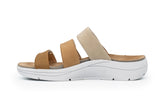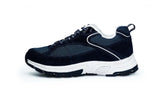Ankle tendon pain is a common issue that affects many people, often resulting from injuries, strain, or overuse. Whether you’re an athlete, someone who spends long hours on your feet, or simply dealing with the wrong footwear, understanding the causes and treatments of ankle tendon pain is key to recovery and prevention.
Anatomy of the Ankle Tendons

The ankle is supported by several tendons that connect muscles to bones, providing both movement and stability. Some of the primary tendons include:
-
Achilles Tendon: Connects the calf muscles to the heel bone and powers walking, running, and jumping.
-
Posterior Tibial Tendon: Supports the arch of the foot and aids inward movement.
-
Peroneal Tendons: Located along the outer ankle, providing stability.
-
Anterior Tibial Tendon: Helps lift the foot upward.
These tendons are constantly in use, making them prone to strain, inflammation, or injury.
Causes of Ankle Tendon Pain

Several conditions can lead to tendon pain in the ankle:
-
Ankle Tendon Tear: A partial or complete tear caused by sudden trauma or wear and tear.
-
Ankle Tendon Injury: Strain or overuse, common in runners, dancers, and athletes.
-
Overuse and Strain: Repetitive stress leading to inflammation and pain.
-
Inflammation and Tendonitis: Caused by overuse, improper footwear, or abnormal foot structure, often worsened by shoes that lack arch support.
Symptoms of Ankle Tendon Pain
Common signs include pain or tenderness near the affected tendon, swelling, stiffness, difficulty bearing weight, or weakness in the ankle. Some may even feel a snapping or popping sensation during injury. Recognizing these symptoms early allows timely treatment and prevention of complications.
Treatment Options for Ankle Tendon Pain

Treatment depends on severity and cause but generally involves a combination of care approaches:
-
Rest and Immobilization
Reducing activity and using a brace or splint helps the tendon heal without additional strain. -
Physical Therapy
Exercises to improve strength, flexibility, and motion are crucial. A therapist may also recommend massage or ultrasound techniques for recovery. -
Medication
Anti-inflammatory drugs can help with pain and swelling, while doctors may prescribe stronger options for severe cases. -
Orthotic Support
Supportive footwear and orthotic devices play a major role in managing tendon pain. At DiabeticShoe.in, you’ll find specialized men’s orthopedic footwear and women’s footwear designed with arch support, cushioning, and stability to reduce tendon stress. -
Surgical Intervention
Reserved for severe cases like complete tendon tears where conservative care fails. Recovery includes rehabilitation and guided therapy.
Preventing Ankle Tendon Pain
Prevention is about protecting your tendons from excessive strain. Warming up before exercise, incorporating strengthening routines, and listening to your body’s warning signs are essential. Footwear choice is especially critical—shoes with proper cushioning and arch support, like those from DiabeticShoe.in, can significantly lower the risk of tendon-related pain.
Keeping You Steady on Your Feet
Ankle tendon pain can interrupt daily life, but with the right awareness, supportive footwear, and timely treatment, it doesn’t have to hold you back. Paying attention to symptoms, choosing healthier footwear, and making mindful lifestyle adjustments will keep your steps steady and strong.








